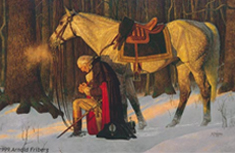A few years ago I wrote a piece about the importance of Thanksgiving history. I thought it would be good to share it with you today. Happy Thanksgiving to you and your family!
A Heritage of Thanksgiving
The snow fell early that winter of 1778 – and stayed. The extreme low temperatures saw the Schuylkill freeze over. From the beginning, life in Valley Forge was grim. The huts were smoky and dark. Meal after meal, the soldiers’ food consisted of “firecake” – wheat of cornmeal poured into a kettle of water, mixed, and ladled out on a big stone in the middle of an open fire, where it baked.
For General George Washington, who saw the members of his Continental Army dying naked in the frost of winter, Valley Forge became an unbearable nightmare. When the House of Representatives asked him on September 24, 1789, to issue a proclamation designating a national day of thanksgiving, he purposefully referred to those horrible months he spent at Valley Forge. Funny that he would recollect a time of suffering rather than a time of plenty when offering thanks. But in his proclamation, Washington asked all Americans to look to “That great and glorious Being who is the beneficent author of all the good that was, that is, or that ever will be, that we may then unite in rendering unto Him our sincere and humble thanks for His kind care and protection of the people.”
It was from that proclamation that the present-day national celebration of Thanksgiving springs. While the governing council of Charlestown, Massachusetts, on June 20, 1676, proclaimed a day of thanksgiving for their good fortune, it was George Washington who had the task to inaugurate a national day of thanksgiving.
The other great Presidential Thanksgiving Proclamation came from the pen of Abraham Lincoln in 1863. How ironic that in the midst of a war that was tearing his nation apart, Abe Lincoln would find the value in offering thanks. He asked his fellow Americans “to set apart and observe the last Thursday of November as a day of thanksgiving and praise to our beneficent Father who dwelleth in the heavens.” Lincoln asked his countrymen to admit to their mistakes and shortcomings “in humble sorrow.”
He wrote, “We have forgotten the gracious hand which preserved us in peace and multiplied and enriched and strengthened us, and we have vainly imagined, in the deceitfulness of our hearts, that all these blessings were produced by some superior wisdom and virtue of our own.”
Abraham Lincoln was once asked how a person could best express thanks. Lincoln, then not yet president, recalled that in his youth, his mother had instructed him to give thanks for whatever was on the table, whether he wanted to eat it or not. “Give thanks in everything,” Lincoln instructed. “That which you can swallow whole and that which you must struggle to consume.” His point was that true thanksgiving even means sometimes giving thanks for difficulties, which is also a profoundly humbling act.
That is probably what George Washington had in mind when he issued that first proclamation. He wasn’t recalling Valley Forge because he had fond memories. But rather, it was a touchstone in his life that humbled him and made him aware of the many things he had to be thankful for.
On this Thanksgiving some Americans, even in the midst of our nation’s economic challenges, will have a bountiful holiday – plenty of food, football, and fun. Others may be facing a personal Valley Forge, with suffering and pain. George Washington and Abraham Lincoln faced both, and when they did, they always said “thanks.”



